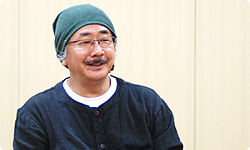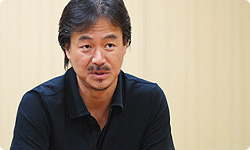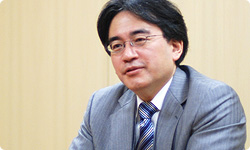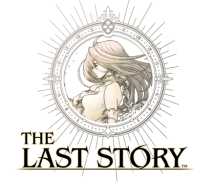2. An Extended Game of Catch
I get the feeling that the two of you are involved in a game of catch, in the sense that Sakaguchi-san ‘throws’ you his vision of the game world he wants to create, which you then catch and return to him in the form of music.
Yes, you’re right. At first, there was a gap between what Sakaguchi-san wanted and what I was trying to express, but over time, Sakaguchi-san has stopped telling me what to do. From the time of the first Final Fantasy onwards, he has left everything to my judgment.
The only time when we had a difference of opinion was on the first Final Fantasy title, wasn’t it?
Right. But you have always been very particular about the overall direction of the games you create. This was particularly the case with The Last Story.
So for Sakaguchi-san, it’s extremely important that the elements of the game all fit into this overall approach. He will give you the freedom to express things in the way you want within your area of expertise, but he refuses to compromise when it comes to his overarching vision for the game.
That’s right. He’ll always let you know when you’re going wrong. Sakaguchi-san makes music himself, so he is very particular about this side of things. I find it very hard to pull the wool over his eyes! (laughs)
I’ll pull him up on things and say: ‘Aren’t you cooking things up with chords here?’ (laughs)
Ah, it hurts to hear those words, especially when you know you’ve been guilty of things like that yourself… (laughs)
It certainly does! (laughs) I remember that Sakaguchi-san once dropped into the studio during recording and there was a single note that was in the wrong place. He said: ‘Hey, that note is clashing with the others’. Then he left, just like that.

Pretty impressive, wouldn’t you say? (laughs)
It certainly makes quite a contrast with the episode where you altered your opinion once the order of the songs in FF1 was changed. (laughs)
(laughter)
We’ve spoken about how important the overall direction of the game is to you, Sakaguchi-san. But how precisely do you communicate your vision to Uematsu-san? It must be hard to explain something as abstract as that?
It is. You can explain the game world, or the story, with your words, but without actual images, it can be tough to really communicate your vision on the overall direction. So Uematsu-san will rework the music again and again, while we play a kind of game of catch. But I’m careful about not giving him too much in the way of specific instructions. I won’t say things like: ‘It should sound like this piece in this opera…’ If you do that, he will end up feeling constrained by that particular piece of music and the end result won’t be any good.
It must be a very delicate task to communicate your vision without hindering anyone’s creative inspiration.
Indeed it is. I just end up saying: ‘I’m sorry, Uematsu-san. That’s not it!’
It’s true that he’s never given me the name of any specific piece of music. I’m always thinking about the best way to present the music to him, but you can’t fool him. If you haven’t got it exactly right, he’ll let you know. (laughs)
(laughter)
What I’ve realised after working together for all these years is that there’s just no substitute for giving it your all. I can read the scenario and come up with ideas on the back of that. But if I present them to Sakaguchi-san, and he says they’re wrong, there is no sense in questioning his judgement. In the end, he’s the only one with a vision of what he wants to create, so when he says something’s wrong, it’s wrong.
You realise that your interpretation of how the game should be has diverged from his.
That’s right.
Why do you think the two of you have been able to continue this game of catch over so many years?
I’m not sure if it’s my place to say this, but I think that Uematsu-san has a surprisingly serious side to him, which is something he shares with me.
Surprisingly serious, he says! (laughs)
Well, there’s something precise and methodical about him, a seriousness of purpose. I think that’s something that comes out in his music. I just feel that we’re on the same wavelength.

Perhaps we have a lot of shared values. A lot of the things we’ve come to see as important are the same.
Ah, that could well be it.
It might sound a bit glib, but there really is more to work than making money. I think that’s something we both believe. You have to be considerate towards your parents, look after your family, meet your friends for the occasional drink. I think that both Sakaguchi-san and I share this ability to take enjoyment from quite simple things like that.
It does sound like you share a similar set of values, which is why you can trust each other and understand where the other is coming from, while also being able to discuss problems with each other. I think it’s a really precious thing in the creative industries to maintain a close relationship while consistently producing results.
I think that with music, there are those tunes that you like the instant you hear them, and then there are those slightly more unusual songs that some people will love, and others won’t. I think that Uematsu-san’s music can occasionally divide people, but there is always something insistent about the melodies. When I hear them, I want to make the effort to embrace this music.
I’m very happy to hear you say that.
I’ll be listening, and realise that some change has come over me. I’ll even start to think that it might be a good idea to adapt the game to fit the music.
Judging from your response to the music, it seems as if you feel the music has managed to express something you weren’t able to fully envisage from the start. It really does sound like you have a very special relationship.
For this title, I got Uematsu-san to write about forty pieces of music, and I feel that The Last Story itself changes as you listen to the music. That’s the power of Uematsu-san’s melodies. It’s not simply that the music is beautiful, it’s also the fact that his humanity comes across in them. They are instantly recognisable as his songs.
I have no doubt that the vast majority of Uematsu-san’s fans would agree with you wholeheartedly.
(sighing) As long as I don’t get found out… Who knows when the mask might slip, revealing the truth…
What do you mean by that?
Well, even though I’ve been working on it for so long, I’ve never had confidence in my own music.
Is this something you’ve felt since the start of your career?
Yes, it is. There will be one or two tracks in each game which I really like, but I can never shake the thought that I’m going to be revealed as somehow lacking.
I understand how uncomfortable it feels to be praised for something that you are not totally convinced by yourself. But I’d say that this is a trait shared by all kinds of creative people who have had success in their field of endeavour. It’s precisely these feelings that push you to strive harder in your next project. I think that for creative people, these feelings are actually really important.

It’s true that I always want to do things a little better next time.
I have no doubt that what you put into your work comes across to the player listening to your music. And that is what has kept you at the forefront of your field for so long.
Well, I’m not at all conscious of being at the forefront of anything! (laughs) But thank you very much.
I think that in creative industries, it’s a really rare and precious thing for a partnership to have remained intact for a quarter of a century, and to have continued to excel.
When you put it like that, it has been a long time, hasn’t it? It is about twenty-five years. Mario’s just reached his twenty-fifth anniversary, and we’re doing the same…
A quarter of a century… (laughs)
I think it’s really incredible that the core Mario team are still working together after twenty-five years, and now speaking to the two of you, it’s really brought it home to me once again how valuable it is to have a relationship that can hold together for that span of time.
